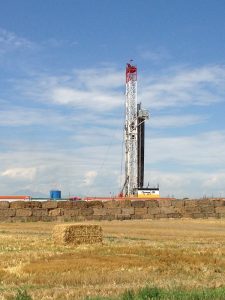
On September 22nd the UK Government announced the official lifting of the moratorium on fracking for shale gas. This was a ban put in place in 2019 after much opposition from community groups and environmentalists, as well as a report by the Oil and Gas Authority.
The Sustainable Gas Institute’s Dr Jasmin Cooper began her research career investigating shale gas and shares her expert perspective on why this policy U-turn could be a red-herring for the UKs energy strategy.
Shale gas is natural gas that is produced from shale formations. It has the same composition and chemical properties as the natural gas we’re all familiar with, but the key difference is in the rock the gas is extracted from. In conventional gas reserves, like those in the North Sea and Qatar, natural gas is extracted from a porous rock such as sandstone. Being porous, there are channels the gas can travel through which makes extraction relatively straightforward. Shale is not porous, so the natural gas is held in pockets which are not connected. Therefore, to make the gas extractable, fractures must be artificially created to connect the pockets and provide a pathway for extraction. The process, called hydraulic fracturing, has become more commonly known as ‘fracking’.
Hydraulic fracturing is when a mixture of water, sand and chemicals (including antibacterial agents and chemicals which make the solution more viscous) is injected into rock under high pressure. Large quantities of the solution are needed along with energy to inject it at the pressures required.
The 2019 Conservative Party manifesto pledged the moratorium would not be lifted unless hydraulic fracturing could be proven to be safe scientifically – in regard to earthquakes caused by hydraulic fracturing. But since then, there has been little scientific evidence to prove it is. The British Geological Survey (BGS) published a report on September 22nd 2022 which found that more work is needed to understand the risk of earthquakes, as well as how to manage those risks.
Hydraulic fracturing has been carried out on a large scale in the USA, where it led to a significant increase in natural gas production and is credited with transforming their gas market.
Understandably, the transformation in energy security and the jobs a shale gas industry could create are put forward as the main arguments for developing it in the UK. The energy crisis in Europe as a result of the Russia-Ukraine conflict – with gas prices climbing to a record high as mainland Europe shifts away from its dependence on Russian gas – is another driver of the Government’s decision to lift the ban- with the intention of boosting domestic production and lessening the rise in energy costs.
But the UK is quite different to the USA, in the geology, extent of our reserves and onshore infrastructure to manage any gas extracted. As of September 2022 there are no commercially operating shale gas wells in the UK, and just two exploration wells, both owned and operated by Cuadrilla.
It takes time to determine whether a shale gas well will produce marketable quantities of gas, and many tests are needed. Surveying the geology of the site, studying core samples for the presence of gas, as well as hydraulic fracturing tests so see how much gas can be liberated – these all take time.
Given the minimal shale gas activity in the UK since 2010 – when the first UK shale gas exploration well was drilled – it is highly unlikely the industry could grow in size and scale at the rate required to have the desired impact on energy supply and security. It’s also questionable whether shale gas could have an impact on energy prices. The UK’s oil and gas industry is largely in the North Sea. Unlike the USA there is little onshore supply chain infrastructure. Significant investment into new infrastructure to process shale gas to pump it into the UK’s gas grid will be needed. These, in addition to the costs of drilling and hydraulic fracturing could make shale gas far less cost competitive than the Government are suggesting.
Overall, it is unlikely the lifting of the moratorium will have an impact the UK’s energy security and prices. The small scale and limited activity of the industry mean there is a long way to go before the industry could reach commercial scale productivity. The strong social and environmental opposition would likely also slow down any progress in developing a shale gas industry. All in all, shale gas is not going to be an answer to the UK’s energy crisis and other avenues would be better to explore.